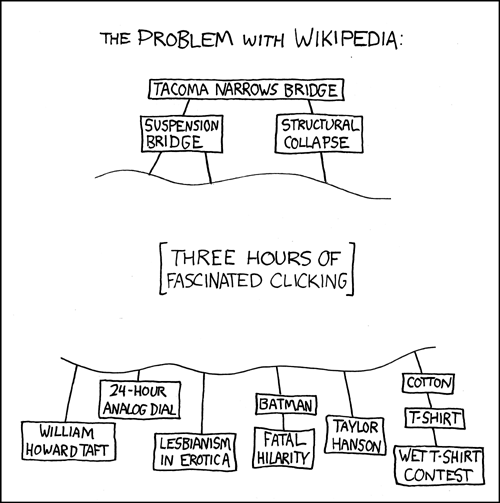XKCD put it best (as it almost always does):

This could also be considered the problem with tabbed browsing, or the Unbearable Lightness of CTRL-[Left Click], or something along those lines. It's also the problem with having a boring job that I'm too efficient at for my own good, especially during the summer hours.
Anyway, after a conversation last night about how absurd Richardson's Pamela is*, I decided to read more about the book. It'd been maybe ten years since I read the novel, and I didn't exactly care for it at all, but the more I tried to convince the person I was having this conversation with of the absurdity of the book, the more she became convinced that the book sounded really good and interesting and like something she should pick up and read through. So I was trying to dissuade her from it, and arguing that if you actually wanted something good, you should read Shamela instead, by Henry Fielding, and if you wanted something great, you should just skip over Shamela and move straight on to Joseph Andrews, which is actually, you know, great.
* And it is an absurd book, make no mistake. It's a book about a virtuous young girl, whose master keeps trying to rape her, eventually abducting her to his country house and trying to have his way with her there. She successfully resists him, and, in reward for her virtue**, her attempted rapist instead marries her. And so it's okay. Compounding the absurdity is that the book is written entirely as an epistolary novel, in the form of letters and diary entries, so there are moments where Pamela is writing that Mr. B is trying to rape her, as he is trying to rape her. Deliriously absurd.
** Seriously, the full title of the book is Pamela, or Virtue Rewarded, so we know how we're supposed to interpret the ending.
But convincing someone to skip over the original and read the parody doesn't always work so well, since part of the strength of a parody comes from knowing what it's parodying. I missed a lot of the jokes of a classic movie like UHF, because I hadn't seen, say, The Treasure of the Sierra Madre, and The Simpsons episode where they do a musical version of A Streetcar Named Desire had a lot less impact on me when I'd never seen the original and didn't actually know that Streetcar wasn't a musical in the first place.
And but so I spent an inordinate amount of time on the Joseph Andrews Wikipedia page, and then I saw that Joseph Andrews, in addition to having one of the great fight scenes of literature (involving a bunch of dogs attacking a preacher, all done in the style of Homer's lost comedic epic), also takes aim at Colley Cibber. Now, I didn't know who Colley Cibber was at the time of reading Joseph Andrews the first time, but later on in college I was to read Alexander Pope's The Dunciad, which is one of the greatest demolitions in print.
Pope crowns Cibber the King of the Dunces, and spends an epic length demolishing Cibber's reputation, at one point literally having him dive into shit in front of Cloacina, the Roman Goddess of the sewers, among other things. It's utterly brutal, making most of the rap battles of the 80s and 90s look tame by nature (not the later rap battles, which involved actual guns and such, of course). Utterly brilliant and completely brutal.
And then I was on to the non-decimal nature of British currency, (the L.s.d. system, as it's sometimes known, apparently).
Onwards and outwards, online...

